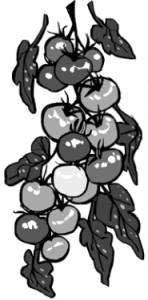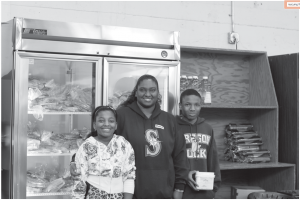Local entities like Slow Food Greater Olympia, the Community Farm Land Trust, regional tribes, and the dozen nearby seasonal or year-round farmers markets all affirm that we live in a community that treasures its thriving small farms. We are a community that likes its local food.
Slow Food Greater Olympia members make up an energetic local chapter of an international organization that focuses on foods and farms unique to each area. The group’s draft statement of beliefs, its manifesto, declares that local food “is not only more delicious but supports our local food system, helping ensure that our region is self-sufficient.“ I would add that sustainable local agriculture production on the farms that produce that food serves also to preserve our rich soils and helps them to capture carbon in a way that mitigates the impact of climate change.
Our Community Farm Land Trust is a textbook model of how a small local non-profit with a cutting-edge mission and strategy can persist and endure.
Late winter, as I write this piece, I am challenged to “eat local.” My own garden is providing celeriac, leeks, mâche (corn salad, lambs lettuce) and curly parsley, but little else. The farm fields lack the fall’s abundance. With our recent extended cold spell I can’t even count on finding kale and collards, usual centerpieces of winter meals, at the Olympia Farmers Market. So this time of year I often prepare potato leek soup or a mix of roasted carrots, garlic, squash, and potatoes. I turn to bean dishes of every sort, shellfish and cabbage/carrot slaw for my late winter local food meals.
Native tribes and native foods
I appreciate the regional tribes for their contributions to my “eat local” late winter meals and the local farmers who grow what doesn’t fit in my backyard garden.
To the Makah Nation I give appreciation for the Ozette potatoes featured in my hearty winter dinners. I find the Ozette easy to grow in nearly any part of my yard and the flavor fits my recipe choices at this time of year. The ease in growing Ozette potatoes comes from its history. Grown here for more than two hundred years, this potato is well adapted to our cool and wet early summers and dry August growing conditions. Tribal accounts suggest that the potato arrived here on Spanish ships as they sailed from South America to Neah Bay more than two centuries ago. In late winter, I am grateful for the long history of stewardship of this potato grown and eaten by Makah tribal members these past centuries.
Inchelium Red garlic provides a softly robust addition to my winter meals. Like the Ozette potato, this garlic has a Washington tribal heritage. It was grown on the Colville Indian Reservation, before being widely introduced to garlic lovers everywhere. Both the garlic and the potato are grown by our local farmers who bring them to market in September. They store reasonably well even without a root cellar, thus they are fit for late winter meals.
The Squaxin and Nisqually tribes have managed the shellfish beds for centuries. Today, the tribes and other numerous small and large scale shellfish farmers grow the clams, oyster and mussels that are ideal for late winter “local food” meals.
Community Farm Land Trust saves and supports local farms
For its support of our local farmers, I extend appreciation to the Community Farm Land Trust (CFLT), more formally known as South of the Sound Community Farm Land Trust. I support that organization with my volunteer time. As a donor I fully embrace its mission: to save farms and keep small farms flourishing. The organization’s founders were visionaries. They saw the potential for new ways to preserve farmland. Through their patience and persistence, CFLT members built partnerships and coalitions even when projects met with resistance or failure. Indeed the CFLT is a textbook model of how a small local non-profit with a cutting-edge mission and strategy can persist and endure. It is one of very few successful national models of how the community land trust model can support the viability of local farmers in spite of the pressures of rising local land values.
The CFLT owns farmland that is leased to farmers for the long-term (Scatter Creek Farm and Conservancy – home to Kirsop Farm, and a portion of the Garden Raised Bounty (GRuB) farm on the west side of Olympia). CFLT also holds an agricultural conservation easement to protect historic Oyster Bay Farm. Many in the community enjoy food produced from CFLT farmlands by purchasing Kirsop Farm’s meats, eggs or vegetables; GRuB vegetables; and eggs or meat from Oyster Bay Farm.
In addition to saving farmland, CFLT is working with Stephen Bramwell, the Thurston County WSU Extension Director and Agriculture Faculty. The current joint work is a regional project to revive local grain production, processing and storage. Farmers need the opportunity to share their knowledge related to small-scale grain equipment and growing practices. Each January, the land trust hosts a Grain Equipment Field Day to bring the farmers together.
The CFLT also provides storage space for an historic but fully functional Clipper Super 47B Seed Cleaner shared and used throughout the year by several local farms for grain cleaning. It is centrally located and just the right size to meet a variety of cleaning needs. Kirsop Farm, for example, uses the Clipper to clean farm-grown grains they feed to hens and meat chickens. That means even the animal feed is locally grown when we eat the eggs and meat. Thurston County WSU Extension uses the clipper to clean grains from local farmers destined to the WSU taste-testing labs and eventually to the brewers and distillers seeking flavors of the grains grown in our watershed.
Because we are a community that likes its local farms and its local food, we take on the challenge to eat local in late winter. Thanks to farmers, tribes and local food and farm supporters for keeping our food local.
To learn more
Check out Slow Food Greater Olympia activities at http://www.slowfoodolympia.org/. The Ozette Potato and Inchelium Garlic are heritage foods on the Slow Food USA Ark of Taste. More information is available at http://www.slowfoodusa.org/ark-of-taste-in-the-usa
The Community Farm Land Trust is at http://www.communityfarmlandtrust.org/. In May, be on the lookout for the 2019 Direct Sales Farm Map prepared by the CFLT and featuring 60 or more local farms that sell direct to all of us.
Find information on the agricultural related research and projects of Thurston WSU Extension at http://extension.wsu.edu/thurston/agriculture/.
Loretta Seppanen currently serves on the Board of Directors of the South of the Sound Community Farm Land Trust and Slow Food Greater Olympia. She is an advocate for small farms and local food.
Drink in the grains of our territory
This summer, on August 17, the Tumwater Brewfest will give all of us an opportunity to drink in the grains grown on our soils. Several local brewers will be serving up beer from those WSU barley trials. I’ll see you there as we toast the flavors of beers direct from our rich local soils.


Be First to Comment